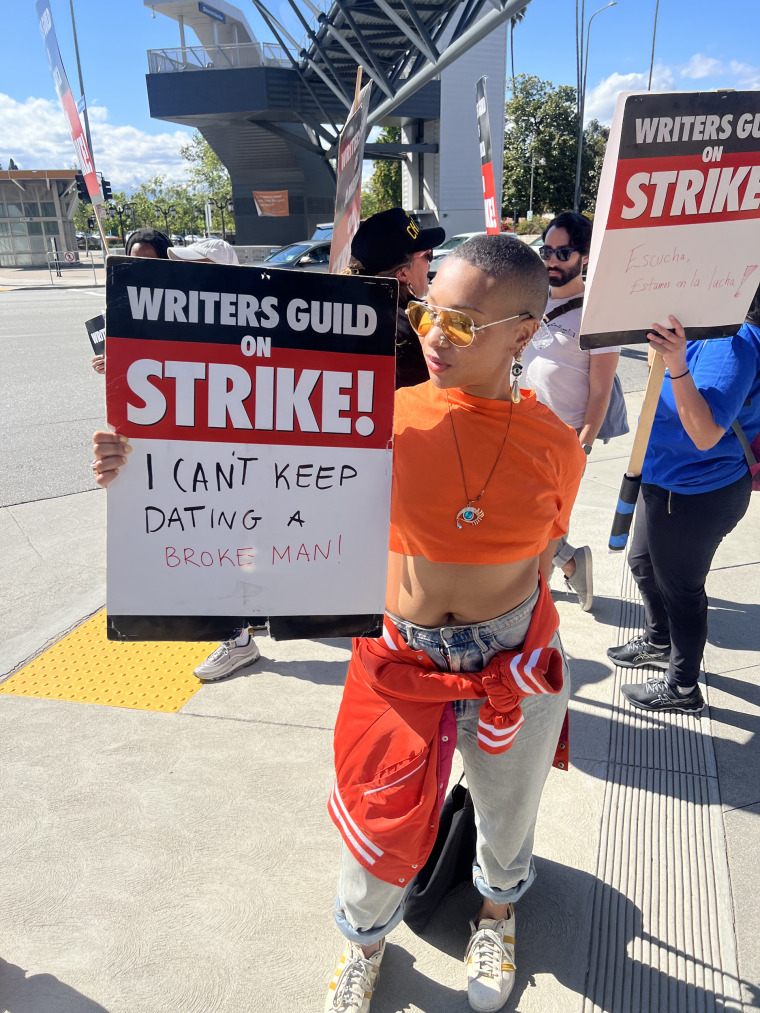As the Hollywood screenwriters’ strike enters its third week, Black picketers see the push for better pay and contract terms as a way to fortify hard-won gains that they say aren’t generating sufficient returns for creators of color.
The Writers Guild of America kicked off its strike on May 2, bringing much of the entertainment industry to a halt after failed negotiations triggered the first walkout in nearly 15 years.
For weeks, thousands of writers have campaigned for pay increases and changes to a streaming-based business model that many say has imperiled their livelihoods. Black guild members see the fight as bound up with another one: Improved representation in TV and movies, they say, has come at the cost of sustainable careers for the very writers driving that progress.
After nationwide mass protests against the murder of George Floyd in 2020, streaming operators including Netflix, Disney+ and Amazon Prime Video joined a wave of major companies that publicly committed to improving racial equity in their ranks and products.
Since then, streamers have by some measures earned higher marks for diversity than traditional counterparts: Minority writers were credited in 20% of streaming films in 2022, compared to 12.4% of theatrical releases, according to UCLA’s latest Hollywood Diversity Report.
But some in the industry say that work on the streaming side in particular is becoming more precarious and less remunerative.
“They don’t really give shows a chance to find an audience the same way that they used to,” said Kyra Jones, 30, a Los Angeles-based writer and actress.

The last two projects Jones wrote for — “Queens,” a musical drama that aired on ABC’s broadcast network featuring R&B singer Brandy and rapper Eve, and “Woke,” a comedy that streamed on Hulu about an on-the-verge cartoonist — were canceled after one season and two seasons, respectively.
Jones said her work on “Queens” has netted her at least $16,000 from residuals, or compensation for content syndication or streams, compared to just $6,000 for “Woke.”
Among WGA’s stated demands is that studios reconcile pay disparities between broadcast and streaming like the one Jones pointed to. The guild also says streaming shows are canceled more frequently, creating less stable schedules for creators as entertainment giants continue leaning into their streaming offerings.
What’s being missed is just how much compensation for writers has shifted with the new era of television.
Charlene Polite Corley, Nielsen
A recent WGA survey found that the median weekly pay for writer-producers has shrunk by 23% over the last 10 years when adjusted for inflation.
“What’s being missed is just how much compensation for writers has shifted with the new era of television,” said Charlene Polite Corley, vice president and head of diverse insights and initiatives at Nielsen.
A spokesperson for the Alliance of Motion Picture and Television Producers, which represents major media companies in negotiations with the WGA, referred to previously released statements about the strike, saying that hiring quotas are “incompatible with the creative nature of our industry” and that “writers have only recently begun to see” a 46% increase in streaming residuals following 2020 contract negotiations.
NBCUniversal, the parent company of NBC News, is a member of the AMPTP.
Jones said she had started development on a show about Black cowgirls that she recently sold to Freeform, an ABC multiplatform channel aimed at younger viewers, but the strike interrupted that work. Her savings — and her parents — will help her “stay alive” in L.A., she said, even if she has to find a new apartment with a roommate. In the meantime, she got a second job at Northwestern University as a virtual advocate for students affected by sexual violence.
The last WGA strike, which started in late 2007, lasted about three months and left dozens of shows shortened or canceled. The popular Tracee Ellis Ross-led comedy “Girlfriends,” for example, ended abruptly without a series finale in early 2008. Black social media users have speculated recently whether other shows featuring racial minorities could meet similar fates this time.
#Striking #Black #WGA #writers #theyve #boosted #diversity #streamers #arent #reaping #rewards


